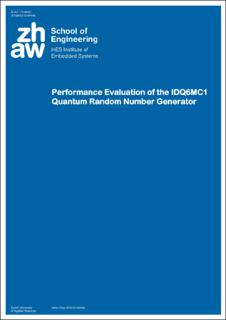Please use this identifier to cite or link to this item:
https://doi.org/10.21256/zhaw-25481Full metadata record
| DC Field | Value | Language |
|---|---|---|
| dc.contributor.author | Zimmerli, Lea | - |
| dc.contributor.author | Rüst, Andreas | - |
| dc.date.accessioned | 2022-08-22T14:24:07Z | - |
| dc.date.available | 2022-08-22T14:24:07Z | - |
| dc.date.issued | 2022 | - |
| dc.identifier.uri | https://digitalcollection.zhaw.ch/handle/11475/25481 | - |
| dc.description.abstract | IoT endpoints and systems are popular targets for cyberattacks which is why they need to be protected with strong security algorithms. The keys and tokens that are used for authentication, encryption, access control and many other aspects of modern security all rely upon strong random numbers. While modern operating systems and computers have long had secure random number generators (RNG)worked out, IoT devices still lack a strong source of randomness, also known as entropy, due to their constrained resources. This report evaluates a quantum random number generator targeted at smart devices, IoT and vehicle-to-everything (V2X)applications regarding execution time and energy consumption. | de_CH |
| dc.format.extent | 7 | de_CH |
| dc.language.iso | en | de_CH |
| dc.publisher | ZHAW Zürcher Hochschule für Angewandte Wissenschaften | de_CH |
| dc.rights | Licence according to publishing contract | de_CH |
| dc.subject | Cybersecurity | de_CH |
| dc.subject | Internet of things | de_CH |
| dc.subject | IoT | de_CH |
| dc.subject | True random number generation | de_CH |
| dc.subject | Resource constrained device | de_CH |
| dc.subject.ddc | 005: Computerprogrammierung, Programme und Daten | de_CH |
| dc.title | Performance evaluation of the IDQ6MC1 quantum random number generator | de_CH |
| dc.type | Working Paper – Gutachten – Studie | de_CH |
| dcterms.type | Text | de_CH |
| zhaw.departement | School of Engineering | de_CH |
| zhaw.organisationalunit | Institute of Embedded Systems (InES) | de_CH |
| zhaw.publisher.place | Winterthur | de_CH |
| dc.identifier.doi | 10.21256/zhaw-25481 | - |
| zhaw.funding.eu | No | de_CH |
| zhaw.originated.zhaw | Yes | de_CH |
| zhaw.webfeed | Industrie 4.0 | de_CH |
| zhaw.author.additional | No | de_CH |
| zhaw.display.portrait | Yes | de_CH |
| Appears in collections: | Publikationen School of Engineering | |
Files in This Item:
| File | Description | Size | Format | |
|---|---|---|---|---|
| 2022_Zimmerli-Ruest-Performance-evaluation-idq6mc.pdf | 410.25 kB | Adobe PDF |  View/Open |
Show simple item record
Zimmerli, L., & Rüst, A. (2022). Performance evaluation of the IDQ6MC1 quantum random number generator. ZHAW Zürcher Hochschule für Angewandte Wissenschaften. https://doi.org/10.21256/zhaw-25481
Zimmerli, L. and Rüst, A. (2022) Performance evaluation of the IDQ6MC1 quantum random number generator. Winterthur: ZHAW Zürcher Hochschule für Angewandte Wissenschaften. Available at: https://doi.org/10.21256/zhaw-25481.
L. Zimmerli and A. Rüst, “Performance evaluation of the IDQ6MC1 quantum random number generator,” ZHAW Zürcher Hochschule für Angewandte Wissenschaften, Winterthur, 2022. doi: 10.21256/zhaw-25481.
ZIMMERLI, Lea und Andreas RÜST, 2022. Performance evaluation of the IDQ6MC1 quantum random number generator. Winterthur: ZHAW Zürcher Hochschule für Angewandte Wissenschaften
Zimmerli, Lea, and Andreas Rüst. 2022. “Performance Evaluation of the IDQ6MC1 Quantum Random Number Generator.” Winterthur: ZHAW Zürcher Hochschule für Angewandte Wissenschaften. https://doi.org/10.21256/zhaw-25481.
Zimmerli, Lea, and Andreas Rüst. Performance Evaluation of the IDQ6MC1 Quantum Random Number Generator. ZHAW Zürcher Hochschule für Angewandte Wissenschaften, 2022, https://doi.org/10.21256/zhaw-25481.
Items in DSpace are protected by copyright, with all rights reserved, unless otherwise indicated.